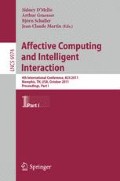Abstract
Using a discovery-with-models approach, we study the relationships between novice Java programmers’ experiences of confusion and their achievement, as measured through their midterm examination scores. Two coders manually labeled samples of student compilation logs with whether they represent a student who was confused. From the labeled data, we built a model that we used to label the entire data set. We then analysed the relationship between patterns of confusion and non-confusion over time, and students’ midterm scores. We found that, in accordance with prior findings, prolonged confusion is associated with poorer student achievement. However, confusion which is resolved is associated with statistically significantly better midterm performance than never being confused at all.
Access this chapter
Tax calculation will be finalised at checkout
Purchases are for personal use only
Preview
Unable to display preview. Download preview PDF.
References
Baker, R.: Data mining for education. In: International Encyclopedia of Education, 3rd edn. Elsevier, Oxford (2010)
Baker, R., D’Mello, S., Rodrigo, M., Graesser, A.: Better to be frustrated than bored: The incidence and persistence of affect during interactions with three different computer-based learning environments. International Journal of Human-Computer Studies 68(4), 223–241 (2010)
Baker, R., Corbett, A., Wagner, A.: Human classification of low-fidelity replays of student actions. In: Proceedings of the Educational Data Mining Workshop at the 8th International Conference on Intelligent Tutoring Systems, pp. 29–36. Citeseer (2006)
Cohen, J.: A coefficient of agreement for nominal scales. Educational and Psychological Measurement (1960)
Craig, S., Graesser, A., Sullins, J., Gholson, B.: Affect and learning: an exploratory look into the role of affect in learning with AutoTutor. Journal of Educational Media 29, 241–250 (2004)
Csikszentmihalyi, M.: Flow: The psychology of optimal experience: Steps toward enhancing the quality of life. Harper Collins Publishers, New York (1991)
DMello, S., Taylor, R., Graesser, A.: Monitoring affective trajectories during complex learning. In: Proceedings of the 29th Annual Meeting of the Cognitive Science Society, pp. 203–208 (2007)
DMello, S., Graesser, A.: Dynamics of Cognitive-Affective States During Deep Learning. Paper under review
DMello, S., Person, N., Lehman, B.: Antecedent-consequent relationships and cyclical patterns between affective states and problem solving outcomes. In: Proceedings of AIED (2009)
Jadud, M., Henriksen, P.: Flexible, reusable tools for studying novice programmers. In: Proceedings of the Fifth International Workshop on Computing Education Research Workshop, pp. 37–42. ACM, New York (2009)
Khan, I., Brinkman, W., Hierons, R.: Do moods affect programmers debug performance? In: Cognition, Technology & Work, pp. 1–14
Kinnunen, P., Simon, B.: Experiencing programming assignments in CS1: the emotional toll. In: Proceedings of the Sixth International Workshop on Computing Education Research, pp. 77–86. ACM, New York (2010)
Kort, B., Reilly, R., Picard, R.: An affective model of interplay between emotions and learning. In: Proceedings of IEEE International Conference on Advanced Learning Technologies, pp. 6–8 (2001)
Lagud, M., Rodrigo, M.: The Affective and Learning Profiles of Students Using an Intelligent Tutoring System for Algebra. In: Aleven, V., Kay, J., Mostow, J. (eds.) ITS 2010, Part I. LNCS, vol. 6094, pp. 255–263. Springer, Heidelberg (2010)
McQuiggan, S., Robison, J., Lester, J.: Affective Transitions in Narrative-Centered Learning Environments. Subscription Prices and Ordering Information 13(1), 40–53 (2010)
Montalvo, O., Baker, R., Sao Pedro, M., Nakama, A., Gobert, J.: Identifying Students Inquiry Planning Using Machine Learning. In: Proceedings of the 3rd International Conference on Educational Data Mining, pp. 141–150 (2010)
Quinlan, J.: C4. 5: programs for machine learning. Morgan Kaufmann, San Francisco (1993)
Rodrigo, M., Mercedes, T., Baker, R., Jadud, M., Amarra, A., Dy, T., Espejo-Lahoz, M., Lim, S., Pascua, S., Sugay, J., et al.: Affective and behavioral predictors of novice programmer achievement. ACM SIGCSE Bulletin 41(3), 156–160 (2009)
Rodrigo, M., Baker, R., Nabos, J.: The Relationships Between Sequences of Affective States and Learner Achievement. In: Proceedings of the 18th International Conference on Computers in Education, pp. 56–60 (2010)
Sao Pedro, M., Baker, R., Montalvo, O., Nakama, A., Gobert, J.: Using Text Replay Tagging to Produce Detectors of Systematic Experimentation Behavior Patterns. In: Proceedings of the 3rd International Conference on Educational Data Mining, pp. 181–190 (2010)
Author information
Authors and Affiliations
Editor information
Editors and Affiliations
Rights and permissions
Copyright information
© 2011 Springer-Verlag Berlin Heidelberg
About this paper
Cite this paper
Lee, D.M.C., Rodrigo, M.M.T., Baker, R.S.J.d., Sugay, J.O., Coronel, A. (2011). Exploring the Relationship between Novice Programmer Confusion and Achievement. In: D’Mello, S., Graesser, A., Schuller, B., Martin, JC. (eds) Affective Computing and Intelligent Interaction. ACII 2011. Lecture Notes in Computer Science, vol 6974. Springer, Berlin, Heidelberg. https://doi.org/10.1007/978-3-642-24600-5_21
Download citation
DOI: https://doi.org/10.1007/978-3-642-24600-5_21
Publisher Name: Springer, Berlin, Heidelberg
Print ISBN: 978-3-642-24599-2
Online ISBN: 978-3-642-24600-5
eBook Packages: Computer ScienceComputer Science (R0)

